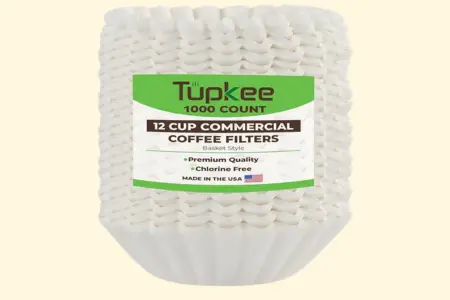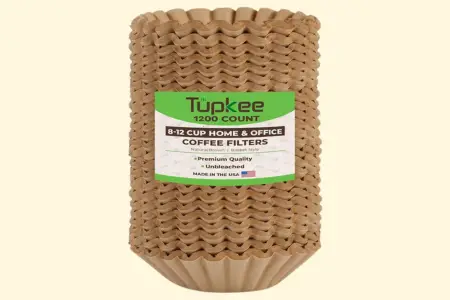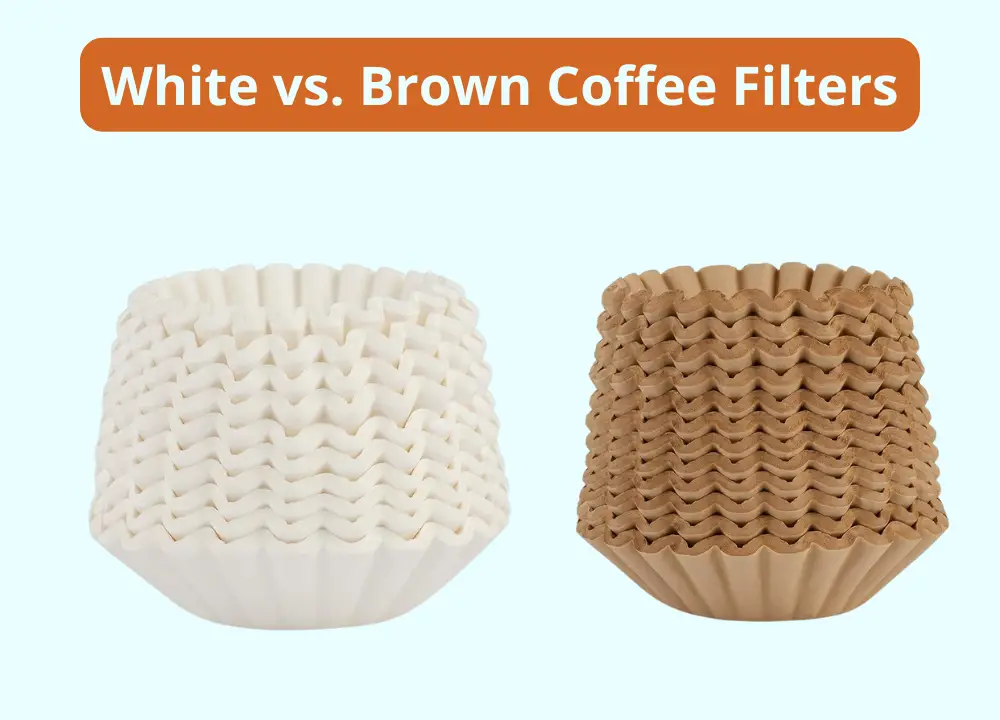Choosing the right coffee filter may seem small, but it affects your coffee’s flavor and quality. White filters are often treated with bleach for a cleaner look.
Brown filters are unbleached and may add a different taste. Knowing the pros and cons of each type is important. This guide will explore their differences and offer tips for brewing the perfect cup.
What Are White Coffee Filters?
White coffee filters are made from paper that has been bleached to achieve a bright white color. This process affects the filter’s characteristics and how it interacts with the coffee grounds.
How White Coffee Filters Are Made
White coffee filters are produced through a process that begins with raw paper pulp. The steps are as follows:
- Raw Material Collection: Natural fibers, usually from wood, are gathered.
- Pulping: The fibers are processed to create a slurry known as pulp.
- Bleaching: This pulp is bleached using chlorine or oxygen to achieve the white color.
- Sheet Formation: The bleached pulp is spread and dried into thin sheets.
- Cutting and Packaging: The sheets are cut into filter shapes and packaged for sale.
This manufacturing process gives white coffee filters their unique appearance. The bleaching process ensures they are free of impurities, making them ideal for coffee brewing.
Benefits Of Using White Coffee Filters
White coffee filters offer several advantages for coffee lovers:
- Cleaner Flavor: They tend to absorb oils and fine particles, resulting in a cleaner taste.
- No Paper Taste: The bleaching process eliminates any paper taste, ensuring only coffee flavors come through.
- Visual Appeal: White filters look clean and professional, enhancing the brewing experience.
- Widely Available: They are easy to find in most grocery stores.
Many coffee drinkers prefer white filters for these reasons. They appreciate the clean taste of their coffee. For those concerned about aesthetics, white filters also add a touch of elegance to any coffee setup.
Potential Drawbacks Of White Coffee Filters
Despite their benefits, white coffee filters have some drawbacks:
- Chemical Exposure: The bleaching process may involve chemicals that some people want to avoid.
- Environmental Impact: The production process can be less eco-friendly compared to brown filters.
- Cost: White filters can be slightly more expensive than their brown counterparts.
- Less Flavor Complexity: Some coffee enthusiasts believe they may strip away some complex flavors.
Choosing white coffee filters involves considering these factors. While they provide a clean taste, some may prefer brown filters for their natural qualities. The decision ultimately depends on personal preference and values.

What Are Brown Coffee Filters?
Brown coffee filters are a popular choice for many coffee lovers. They are made from natural materials and offer a different brewing experience compared to white filters.
How Brown Coffee Filters Are Made
Brown coffee filters are created using unbleached paper. This paper retains its natural brown color. The process involves several steps:
- Harvesting wood pulp from trees.
- Processing the pulp without using bleach.
- Pressing the pulp into sheets of paper.
- Cutting the sheets into filter shapes.
Since brown filters use no chemicals, they are considered more eco-friendly than their white counterparts. Here are some key points about their production:
- No bleach is used in production.
- They are biodegradable.
- They may have a slightly rougher texture.
| Feature | Brown Coffee Filters | White Coffee Filters |
|---|---|---|
| Bleaching | No | Yes |
| Eco-Friendliness | Higher | Lower |
| Texture | Rougher | Smoother |
Benefits Of Using Brown Coffee Filters
Brown coffee filters offer several advantages. Many coffee drinkers prefer them for the following reasons:
- Healthier Option: They do not contain harmful chemicals.
- Better Flavor: Some users claim they enhance coffee taste.
- Eco-Friendly: They are biodegradable and reduce waste.
Many people also appreciate their natural look. Brown filters can add a rustic touch to your coffee setup. Using them may also lead to less bitterness in your brew. This happens because the filters allow more oils to pass through.
Here is a quick summary of benefits:
| Benefit | Description |
|---|---|
| Natural Taste | Enhances the flavor profile of coffee. |
| Less Waste | Biodegradable and eco-friendly. |
| Healthier | No chemicals used in production. |
Potential Drawbacks Of Brown Coffee Filters
While brown coffee filters have benefits, they also come with some drawbacks. Here are the main concerns:
- Stronger Paper Taste: Some users notice a paper taste in their coffee.
- Inconsistent Quality: They may vary in thickness and texture.
- More Sediment: Brown filters can let more coffee grounds through.
These issues may affect the overall coffee experience. Users may need to experiment with grind size and brewing time. A coarser grind may help reduce sediment.

Key Differences Between White And Brown Coffee Filters
This section explores the key differences between white and brown coffee filters, focusing on material, environmental impact, and taste.
Material And Manufacturing Process
White and brown coffee filters are made from different materials and go through distinct manufacturing processes. Here’s a breakdown:
| Type | Material | Manufacturing Process |
|---|---|---|
| White Filters | Bleached paper | Processed with chlorine or oxygen to remove color |
| Brown Filters | Unbleached paper | Made from natural paper fibers without bleaching |
White filters are treated to achieve their bright appearance. This process may involve:
- Chlorine bleaching
- Oxygen bleaching (less harmful)
Brown filters retain their natural color. They are often seen as a more eco-friendly option. These filters can be slightly thicker due to the unrefined fibers. This thickness can affect the flow of water during brewing.
Environmental Impact
The environmental impact of coffee filters varies significantly between white and brown options. White filters require more processing, which can lead to greater environmental concerns.
- White Filters:
- More chemical usage during bleaching.
- Higher energy consumption in manufacturing.
- Potential pollution from chemical byproducts.
- Brown Filters:
- Minimal processing, maintaining natural fibers.
- Lower energy use and pollution.
- Biodegradable and compostable in most cases.
Choosing brown filters can be a better choice for the environment. They align with a more sustainable approach. Consider your values when selecting the right filter for your coffee.
Taste And Brewing Quality
The taste and brewing quality of coffee can be influenced by the type of filter used. Many coffee enthusiasts argue that the filter affects the flavor profile of the brew.
- White Filters:
- May impart a slight taste from the bleaching process.
- Generally produce a cleaner cup.
- Less sediment in the coffee due to finer mesh.
- Brown Filters:
- Natural paper fibers can add slight flavors.
- Can allow more oils and sediment through.
- Often results in a richer, fuller body.
Brewing with brown filters can lead to a deeper flavor. If you prefer a cleaner cup, white filters may be the way to go. Experiment with both types to find what suits your taste best.
Pros And Cons Of Each Filter Type
Understanding these can help you make the right choice for your coffee needs. Let’s explore the pros and cons of each filter type.
Pros And Cons Of White Coffee Filters
White coffee filters are popular among coffee drinkers. They are often bleached to achieve their bright color. This process can affect their properties.
Pros:
- Cleaner taste: White filters usually do not impart any flavors to the coffee.
- Visibility: Easier to see when the coffee is brewed, making it simpler to avoid over-brewing.
- Widely available: They can be found in most grocery stores.
Cons:
- Bleaching: The bleaching process may involve chemicals.
- Environmental impact: More processing can mean a higher carbon footprint.
- Cost: Often more expensive than brown filters.
| Feature | White Filters |
|---|---|
| Taste | Cleaner, no flavors added |
| Availability | Commonly found |
| Price | Usually higher |
Pros And Cons Of Brown Coffee Filters
Brown coffee filters are made from unbleached paper. They have a natural brown color. This can lead to different brewing results.
Pros:
- Natural product: No chemicals are used in bleaching.
- Environmentally friendly: Less processing means a smaller carbon footprint.
- Cost-effective: Often cheaper than white filters.
Cons:
- Possible flavor: Some users report a slight paper taste.
- Visibility: Harder to see coffee color while brewing.
- Less common: May not be available at all stores.
| Feature | Brown Filters |
|---|---|
| Taste | Possible paper taste |
| Availability | Less common |
| Price | Usually lower |
Which Coffee Filter Should You Choose?
The choice between white and brown coffee filters affects flavor, environmental impact, and cost.
Factors To Consider: Taste, Environment, And Budget
When selecting a coffee filter, three main factors come into play: taste, environment, and budget. Each factor influences your overall coffee experience.
- Taste:
- White filters often have a bleached taste. Some people say it affects flavor.
- Brown filters are unbleached. They might add a slight earthy flavor.
- Environment:
- Brown filters are more eco-friendly. They are less processed and biodegradable.
- White filters go through a bleaching process. This can harm the environment.
- Budget:
- Brown filters are often cheaper. They are less processed.
- White filters may cost more due to the bleaching process.
The table below summarizes the key differences:
| Factor | White Filters | Brown Filters |
|---|---|---|
| Taste | May have a slight bleached taste | Earthy flavor |
| Environment | More processed, less eco-friendly | Less processed, biodegradable |
| Budget | Generally more expensive | Usually cheaper |
Consider these factors carefully. Your preferences will guide your decision.
Best Coffee Filter For Different Brewing Methods
Different brewing methods may require different types of filters. The choice of filter can impact the brewing process and the final taste of your coffee.
- Drip Coffee Makers:
- White filters work well. They produce a clean taste.
- Brown filters are also suitable. They add a bit of flavor.
- Pour Over:
- White filters are preferred. They provide clarity in taste.
- Brown filters can be used. They may give a richer flavor.
- French Press:
- No filters needed. Use the mesh filter that comes with it.
- Cold Brew:
- Brown filters are recommended. They help retain more oils.
- White filters work too. They create a cleaner cup.
Understanding your brewing method helps in choosing the right filter. Each method may enhance different flavors in your coffee.

